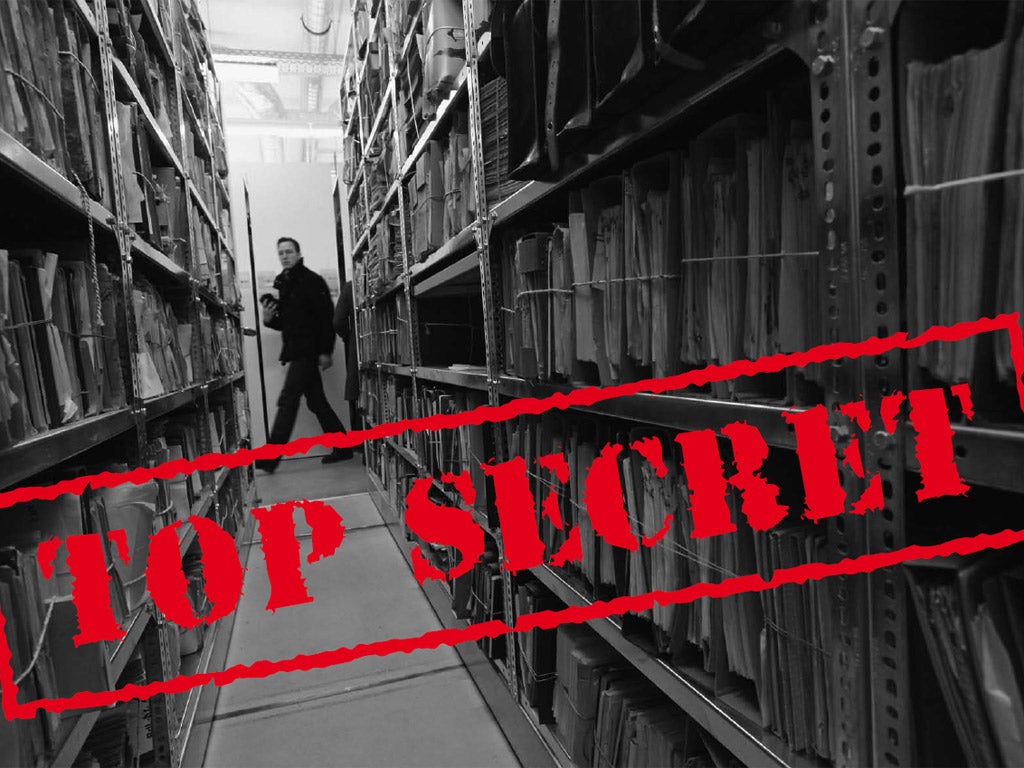The secret’s out: Whitehall’s document classification system devised to thwart German spies in WWII is finally being streamlined

Your support helps us to tell the story
From reproductive rights to climate change to Big Tech, The Independent is on the ground when the story is developing. Whether it's investigating the financials of Elon Musk's pro-Trump PAC or producing our latest documentary, 'The A Word', which shines a light on the American women fighting for reproductive rights, we know how important it is to parse out the facts from the messaging.
At such a critical moment in US history, we need reporters on the ground. Your donation allows us to keep sending journalists to speak to both sides of the story.
The Independent is trusted by Americans across the entire political spectrum. And unlike many other quality news outlets, we choose not to lock Americans out of our reporting and analysis with paywalls. We believe quality journalism should be available to everyone, paid for by those who can afford it.
Your support makes all the difference.It was created by the brightest minds, under the threat of invasion, at a time when even seemingly innocuous information might help the German enemy.
But Whitehall being Whitehall, things change slowly. And so it was only yesterday, 68 years after the end of the Second World War, that the Government finally announced it had got round to scrapping its infamously inefficient way of classifying confidential information.
The original system of five security classifications: Protect, Restricted, Confidential, Secret and Top Secret was devised to ensure that officials properly assessed the threat posed by every piece of paper generated by the Government machine.
And at a time when even statistics on crop yields or livestock numbers could prove useful to the enemy, it made a lot of sense. But with our foes now rather less interested in NHS waiting time statistics or the success of the welfare-to-work programme than they might have been, ministers have finally decided to reassess the current “bonkers” system.
Instead of five security classifications there will only be three, with 90 per cent of the civil service operating within the most relaxed “official” rating. Secret, and in extremis Top Secret, will only be used for less than 5 per cent of documents and files that could jeopardise national security.
The change is likely to have a profound impact both on individual civil servants and the way Government does business.
Officials will, for example, no longer face disciplinary action for leaving a “restricted” document lying around on their desk. It will also prevent the current ludicrous situation where the most secret documents can’t be sent electronically at all – instead having to be printed out and taken by hand across four lanes of traffic on Whitehall between the Ministry of Defence and the Foreign Office.
For the rest of the civil service, it will allow computer systems to be simplified and mean for the first time that officials on the front line will be able to use devices like iPads which are currently banned as a security risk. Perhaps less beneficially, they will also be able to cut and paste things from the internet.
The Cabinet Office minister Francis Maude, who has driven through the new system, said he had been shocked by the sheer inefficiency caused by the classification system. He said that when he first arrived in the Cabinet Office, the security restrictions on his computer made it so cumbersome that it was almost impossible to use.
“It was very, very clunky and I nearly threw it out of the window,” he said. “Anything secret I now look at on paper.”
Mr Maude added that the new system would not only cut costs as Whitehall would be able to buy most new IT equipment “off the shelf”, but would also allow better communication with the outside world. “There are currently documents in Whitehall that are marked ‘restricted’ that are accessible to thousands of people within a department. But the computer systems prevent them from being emailed outside the department to people who need them,” he said.
“There is obviously some really serious heavy-duty national security information which we need to vigilantly protect. But that probably represents less than 3 per cent of all the files in Government. What we need is a system which is proportionate and encourages people to make sensible decisions about what information really needs to be classified.”
But, as with every change in Government, there will be a downside – although this will be for journalists. What fun is it getting leaked a document marked “official” rather than “confidential”?
Join our commenting forum
Join thought-provoking conversations, follow other Independent readers and see their replies
Comments